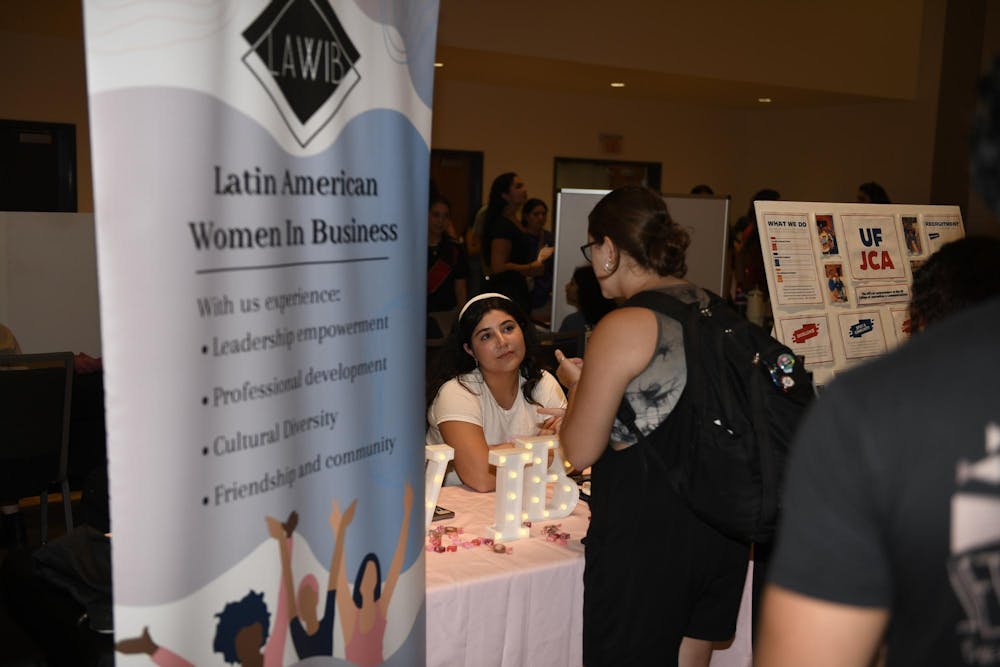Florida’s elimination of diversity, equity and inclusion programs within higher education has bred uncertainty on UF campus. Following 2023 Senate Bill 266, all state-funded DEI programs were eliminated in March, leaving UF’s ethnic extracurriculars with questions.
Despite concerns, encouragement and hope thrives among the Hispanic student body, student leaders say. The Hispanic Student Association hosted its annual Hispanic-Latine Student Assembly Aug. 28 at the Reitz Union, where dozens of Hispanic and Latine students promoted their organizations to students.
Students at the event said the assembly offered a space to ensure there is resilience beyond any challenges and changes. But students are still discussing the uncertainties of the future for DEI initiatives at the university.
Estefania Rodriguez, a 21-year-old computer science senior and president of the UF Venezuelan Student Association, said she’s noticed a funding change.
The organization also has chapters at Florida State University and the University of Central Florida. Rodriguez said the club can rely on funds it’s collected from past fundraisers.
Alexandra Crespin, president of the UF Latino Medical Student Association, said she also noticed a change in the amount of funding the club used to get. With budget cuts, Crespin said the club is now adopting a more cautious approach towards allocating funds.
“We do have to be very cognizant about where our money is going,” she said.
Crespin said it’s more than likely the organization will engage itself in other opportunities to raise money, like outside fundraising for its events.
Some organization members said they have not seen any alterations directly impacting their organization but do worry there is going to be a change.
The treasurer of the Sabor Latino Dance Team, Andrea Engativa, said if a decrease in funding were to happen, the club’s dance experience would no longer be as immersive.
“We might have to restrict the amount of dancers we are allowed on our team,” Engativa said.
“That might be the best way for us to be able to afford supplying all the materials that we need for these performances.”
In the face of budget changes, organization members have found other ways to raise money and keep spreading their name around campus.
Maria Esparza Mancilla, a 21-year-old UF applied physiology and kinesiology senior, has been organizing raffles for the UF chapter of Por Colombia since before the DEI changes. She said the money the organization received prior to DEI conflicts wasn't enough.
“We have never had as many funds,” Esparza said, who is the current president of the organization.
And now with new changes developing, she said raffles continue to feel like an even more promising solution.
Other students are confident money will not be an obstacle for them to keep spreading their name on campus.
Arturo Zarrate, a 19-year-old biochemistry and philosophy sophomore and the financial coordinator of the Hispanic-Latine Student Assembly, said he acknowledges the challenges, like losing the Institute of Hispanic-Latino Cultures, La Salita. But he maintains a positive attitude regarding the future of most of these organizations.
“In spite of the losses that we suffered — with especially La Salita — I think that we can still continue to flourish here on campus,” he said. “Our community has been, of course, weakened.”
Valentina Brown, president of the Central American Latin Organization at UF, said she’s decided to keep a positive attitude regarding the future of her club.
“We just have to persevere with dealing with any budget changes,” Brown said.
Members of these organizations will continue exploring other methods to raise money to maintain the quality of experiences they provide to students on campus.
“As a good Colombian, we have to look at different ways,” Esparza said. “Let them throw shaving cream in our face.”
Contact Isabela Reinoso at ireinoso@alligator.org. Follow her on X @isareinosod.






